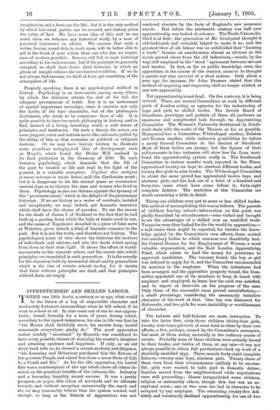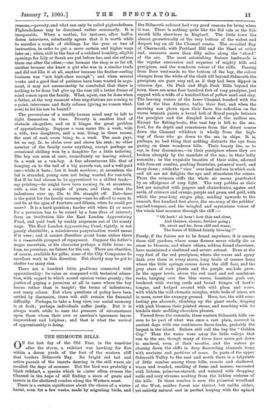be the future of a boy of respectable character and
moderately fortunate surroundings when he left school, if he went to school at all. In nine cases out of ten he was appren- ticed ; bound formally for a term of years, during which, according to the signed indentures, his aim in life was that he "his Master shall faithfully serve, his secrets keep, lawful commands everywhere gladly do." The good apprentice rather crudely " moralised " by Hogarth, was considered to have every possible chance of marrying his master's daughter and attaining opulence and happiness. If only, as an old story-book tells us, he showed a certain modesty and diligence, "his Learning and Behaviour purchased him the Esteem of the greatest People, and raised him from a mean State of Life to a Coach and Six." As for the idle apprentice, his horrid /ate was a commonplace of the age which above all others in- sisted on the practical benefits of the virtuous life. Industry and a becoming humility meant success. It was a pretty prospect, on paper, this vision of servitude and its ultimate reward; and without accepting unreservedly the coach and six, we may reasonably believe that the system worked well enough, so long as the Statute of Apprentices was not rendered obsolete by the facts of England's new economic creeds. But before the nineteenth centmy was half over apprenticeship was looked at askance. The Trade-Unions dis- liked it at first; the generation of Mr. Gradgrind thought it old-fasbioned, and certainly helped to make it so; and, the greatest blow of all, labour was so subdivided that "learning a trade" became an anachronism almost as obvious as the words quoted above from the old indentures,—words, by the way, still employed in the "stock" agreement between servant and master. In fact, as far as public knowledge went, the apprentice, in the course of the century, came to be thought a quaint and rare survival of a dead system. Only about a year ago, for instance, Sir John Brunner stated that this method of acquiring and imparting skill no longer existed, at any rate appreciably.
Yet apprenticeship is not dead. On the contrary, it is being revived. There are several Committees at work in different parts of London acting as agencies for the indenturing of boys and girls to skilled trades. The Jewish Board of Guardians, prototype and pattern of them all, performs an enormous and complicated task through its Apprenticing Committee. The Women's University Settlement in South- wark deals with the south of the Thames as far as possible. Hampstead has a Committee, Whitechapel another, Dalston and Hoxton another, while unknown possibilities lie before a newly formed Committee in the district of Stratford. Most of these bodies are young ; but the figures of their achievements in two instances will show how far from mori- bund the apprenticeship system really is. The Southwark Committee in sixteen months' work, reported in the Times, apprenticed twenty-six boys to nineteen different trades, and twenty-five girls to nine trades. The Whitechapel Committee in about the same period has apprenticed twelve boys and nineteen girls, and has had, out of a total of a hundred and forty-two cases which have come before it, forty-eight complete failures. The statistics of this Committee are worth examining a little in detail.
Thirty-one children were put to more or less skilled trades. The method of accomplishing this was as follows. The parents of children leaving school—information on this point was gladly furnished by schoolmasters—were visited and brought to see the advantages of a skilled over an unskilled trade. Vacancies were then looked for for the would-be apprentices,— a task easier than might be expected, for besides the know- ledge gained by the Committee's own efforts, there existed two auxiliary bodies to which recourse was thankfully had : the Central Bureau for the Employment of Women, a most valuable organisation, and the East London Apprenticing Fund, which exists to lend the money for premiums to approved candidates. The vacancy found, the boy or girl was induced to apply for it, and the Committee recommended its nominee to the employer. When the indentures had been arranged, and the apprentice properly bound, the Com- mittee appointed one of its members to keep in touch with employer and employed, to learn how far each was satisfied, and to report at intervals on the progress of the case. Only three of the successful cases proved unsatisfactory,— a small percentage, considering the necessarily tentative character of the work at first. One boy was dismissed for dishonesty, and two girls for some instability or worthlessness of character.
The failures and half-failures are more instructive. To take the latter first, sixty-three children (thirty-four girls, twenty- nine boys) got work of some kind or other by their own efforts, a few, perhaps, roused by the Committee's emissaries, but most of them acting naturally in the ordinary course of events. Probably none of these children were actually bound to their trades, and twelve of them, at any rate—it was not always possible to obtain fall particulars—took up work of a decidedly unskilled type. There remain forty-eight complete failures,—twenty-nine boys, nineteen girls. Twenty-three of them were from their circumstances unlikely to be success- ful; girls were wanted to take part in domestic duties; families moved from the neighbourhood while negotiations were still proceeding ; illness incapacitated some children, religion or nationality others, though this last was an ex- ceptional cause ; one or Mao were too bad in character to be accepted by any employer. The remaining twenty-five defi- nitely and voluntarily declined apprenticeship for one of two reasons,—poverty, and what can only be called pigheadedness. Pigheadedness may be dismissed rather summarily. It is insuperable. When a mother, for instance, after half-a- dozen interviews, reluctantly agrees that it is worth while to sacrifice a couple of shillings for the year or two of instruction, in order to get a more certain and higher wage later on ; when, still in the face of a subdued hostility, eligible openings for Lily or Sarah are put before her, and she refuses them one after the other,—one because the shop is so far off, another because she knew a girl who was in a similar trade and did not like it at all, another because the feather-curling business was "not high-class enough"; and when several weeks and a good deal of patience have been wasted in argu- ment, it may not unreasonably be concluded that there is nothing to be done but give up the case till a better frame of mind comes upon the family. What, again, can be done when a father, at the very moment when negotiations are coming to a point, intervenes and flatly refuses (giving no reason what- ever) to let his son be bound ?
The perversions of a muddy human mind may be left to right themselves in time. Poverty is another kind of obstacle altogether, and on it hinges the great problem of apprenticeship. Suppose a man earns 28s. a week, with a wife, two daughters, and a son, living in three rooms, the rent of each room being 4s. a week. The man pays, let us say, 2s. to clubs, over and above his rent ; no other member of the family earns anything, except perhaps an occasional shilling won by a daughter for a little tailoring. The boy can earn at once, immediately on leaving school, 8s. a week as a van-boy. A fine adventurous life, that of hanging on to the tail of a big parcels van, and a well-paid one—while it lasts ; but it leads nowhere ; at seventeen the lad is stranded, young men not being wanted for van-tails. But if he had chosen to be apprenticed to a skilled trade— say printing—he might have been earning 8s. at seventeen, with a rise for a couple of years, and then, when the indentures were up, 25s. to 30s. straight off. But—here is the point for the family economy—can he afford to earn 4s. and 6s. at the ages of fourteen and fifteen, when he could get more? It is a bard question ; harder still when £5 or more for a premium has to be raised by a loan (free of interest) from an institution like the East London Apprenticing Fund, and paid back by weekly sixpences out of the scanty wage. The East London Apprenticing Fund, rightly, is not purely charitable ; a mischievous pauperisation would ensue if it were; and it cannot therefore grant loans unless there is a reasonable prospect of repayment. Suppose the father's wages uncertain, or his character perhaps a little loose : no loan, no premium, no future for the son. There are charities, of course, available for gifts; some of the City Companies do excellent work in this direction. But charity may be got to shelter too many sins.
There are a hundred little problems connected with apprenticeship : its value as compared with technical educa- tion, with regard to which sound opinion varies greatly ; the justice of paying a premium at all in cases where the boy learns rather than is taught; the terms of indentures; and many others. But when questions of policy have been settled by discussion, there will still remain the financial difficulty. Perhaps, to take a long view, our social economy is at fault; perhaps individuals suffer justly. But it is always worth while to ease the pressure of circumstance upon those whom their own or another's ignorance leaves improvident and helpless ; and that is what the revival of apprenticeship is doing.















































 Previous page
Previous page